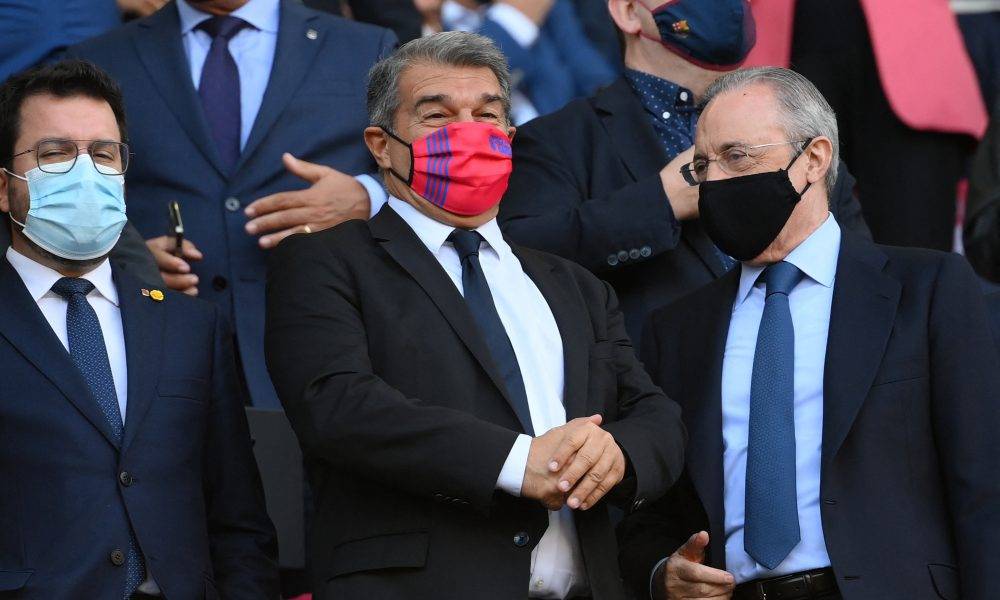The European Super League (ESL) could be back on the agenda in 2024 following a landmark ruling by the European Court of Justice (ECJ).
The ECJ criticized both FIFA and UEFA for their conduct towards the ESL project, ruling that their threats to punish rival clubs and players were “illegal” and part of a wider “abuse of a dominant position”.
Despite the disapproval of a potential ESL, the latest legal update has reopened the debate following the controversial 2021 announcement by Europe’s 12 big clubs of their intention to join a “breakaway league”.
Following the ruling by the European Court of Justice, the new proponents of the ESL concept – sports agency A22 – have unveiled a reformatted competition model that could mean a new headache for UEFA.
Latest European Super League: ECJ ruling against FIFA and UEFA
The ECJ has finally delivered its legal verdict on FIFA/UEFA’s actions against the clubs involved in the original ESL concept, and both governing bodies have come under heavy criticism.
“FIFA and UEFA rules that make any new inter-club football project subject to their prior approval, such as the Super League, and ban clubs and players from playing in these competitions, are illegal,” the statement confirmed.
“There is no framework for FIFA and UEFA rules to ensure they are transparent, objective, non-discriminatory and proportionate.
“The powers of FIFA and UEFA are not subject to any such criteria. FIFA and UEFA are therefore abusing a dominant position.”
However, the ECJ’s statement is also balanced against the fact that ESLs are not endorsing or mocking resumptions, but rather stating where they believe the legal line has been crossed.
“[The ECJ decision] does not mean that a competition such as the Super League project must necessarily be approved. The court does not rule on this particular project in its judgment,” the ruling added in its conclusion.
The ECJ also called on UEFA to address its concerns about internal transparency and governance issues and acknowledge the clubs’ demands for change, which UEFA believes will be met by the move to a league format in the Champions League from next season.
The rules, the format of the “new” European Super League?
Following the European Court of Justice ruling, A22 CEO Bernd Reichart claimed a major victory for ESL’s new plans, outlining how the renewed structure will differ from the 2021 model.
Reichart’s new plan would address previous concerns about lack of competitiveness and qualifications not achieved through athletic merit.
In the new ESL, there will be 64 men’s clubs divided into three divisions, between which there will be promotion and relegation, with participation based on sporting performance in previous seasons without permanent members.
Of the 64 participating teams, the top 32 teams would be divided into two groups – Star League and Gold League – with the bottom Blue League containing the remaining 32.
The teams that finish in the top eight of each league will advance to the knockout stage, including quarter-finals, semi-finals and finals.
The bottom 20 teams in the Blue League would be relegated from the competition entirely and replaced by the top performing clubs from Europe’s domestic leagues.
The two teams that reach the finals of the Gold and Blue Leagues would be promoted, while the two teams that finished at the bottom of the Star and Gold Leagues would be relegated.
Matches would be played midweek, allowing the new competition to run alongside Europe’s domestic leagues.
Is the European Super League taking place?
Fans will be watching the situation unfold with increasing interest, with the ESD challenge seemingly bringing the ESL proposal back into wider focus in 2024.
However, the current situation remains largely unchanged, with both FIFA and UEFA acknowledging the European Court of Justice’s decision but reaffirming their commitment to block any “breakaway league”.
Most of Europe’s domestic leagues and associations reflect this view alongside clubs further down their respective football pyramids.
Manchester United representatives issued a statement shortly after the new plans were announced, insisting they remain loyal to UEFA and the Premier League.
“Our position has not changed,” it said. “We remain fully committed to participating in UEFA competitions and working positively with UEFA, the Premier League and other clubs through the ECA to further develop the European game.”
The final decision on whether or not the ESL could be sanctioned still rests with UEFA, with the recommendation to look into the application of pre-clearance and fairness laws.
Fears of UEFA being dissolved by the ESL have been allayed, but they will come under pressure to make further changes to appease the bigger clubs and ensure a revamped Champions League is the preferred option.









Leave a comment